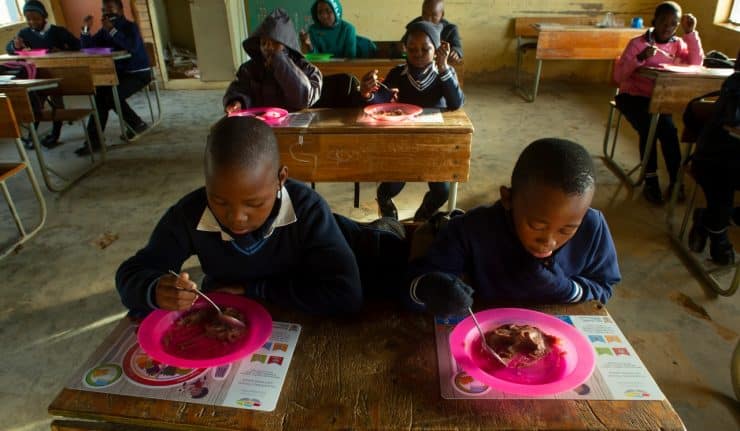The Tiger Brands Foundation (TBF) has served a record 100 million meals to schoolchildren since launching its in-school breakfast programme about a decade ago.
The programme complements the daily lunch provided by the Department of Basic Education as part of the National Schools Nutrition Programme (NSNP).
The NSNP ensures that the country’s most vulnerable schoolchildren have access to a nutritious meal every day.
TBF Operations Manager Karl Muller said the breakfast programme now reaches 104 schools across all nine provinces in South Africa.
It provides nutrition to more than 79 593 schoolchildren a day, with a total of 83 897 beneficiaries.
The foundation was established in 2010 and started serving in-school breakfasts the following year.
TBF celebrated serving 50 million meals in July 2017 – a landmark that took six years to achieve.
However, the next 50 million was reached in half that time (three years), an achievement Mullers said TBF was particularly proud of.
“Firstly, reaching 100 million meals served is a phenomenal achievement and I would like to thank and congratulate everyone involved in reaching this milestone for their hard work, dedication, and professionalism. I can safely say that we are making a difference,” says Muller.
“Secondly, it’s worth noting that the second 50 million meals were served in half the time.
“This is a monumental achievement considering that no in-school meals were served during school closures because of the Covid-19 lockdown.”
Meeting the target despite the global pandemic considering that, despite the school closures we still managed to halve the time it took to serve the second 50 million meals is a remarkable feat.
“It demonstrates the improvements that have been made to the programme and the ever-expanding reach it has across all corners of the country,” says Muller.
He explains that the speed with which the last 50 million meals were served is proof that the foundation has worked tirelessly to streamline the programme, boosting efficiencies and improving processes to ensure that vulnerable learners have access to good nutrition.
One of the main drivers for the establishment of the TBF was to offer support to previously disadvantaged communities that struggle with perpetual poverty.
The foundation aims to make a noticeable socio-economic impact in these communities by ensuring that learners have access to good nutrition.
“Many young learners in South Africa are exposed to multiple risks, including malnutrition, poverty, poor health, and poorly stimulating home environments that could be detrimental to their cognitive, motor and socio-emotional development,” says Muller.
“The foundation’s mandate is to facilitate economic transformation in South Africa through improving learner health and education outcomes.”
Other initiatives
The TBF also supports education through building nutrition centers, thought leadership activities, research, and capacity building.
Since its inception, the foundation has also built 44 new kitchens at schools and refurbished a further 11 to ensure that meals can be prepared in a more hygienic environment.
The total number of kitchen constructions that the foundation has facilitated for its stakeholder partners is eight, with two of those being refurbishments.
In addition, the foundation has facilitated the replacement of 199 pit latrines at schools with cistern toilets.
The foundation has distributed a total of 129 560 food hampers since 2011, with 75 273 distributed up to 2019 and another 54 287 Covid-19 food hampers handed out from April 2020 to date (4 729 of these were donated by sponsors).
In addition to these initiatives, the foundation started food handler training in 2017 and has since conducted 10 food handling courses, across all nine provinces, training a total of 446 food handlers and 39 monitors.
“TBF partnered with Eliopax Training to offer SAQA-accredited training in cookery to Volunteer Food Handlers (VFH) in the schools implementing our breakfast programme,” says Muller.
“The purpose of this training is to assist VFHs to find employment or start a microbusiness once their 24-month volunteer period comes to an end. Where possible, the training is extended to other stakeholders.”
